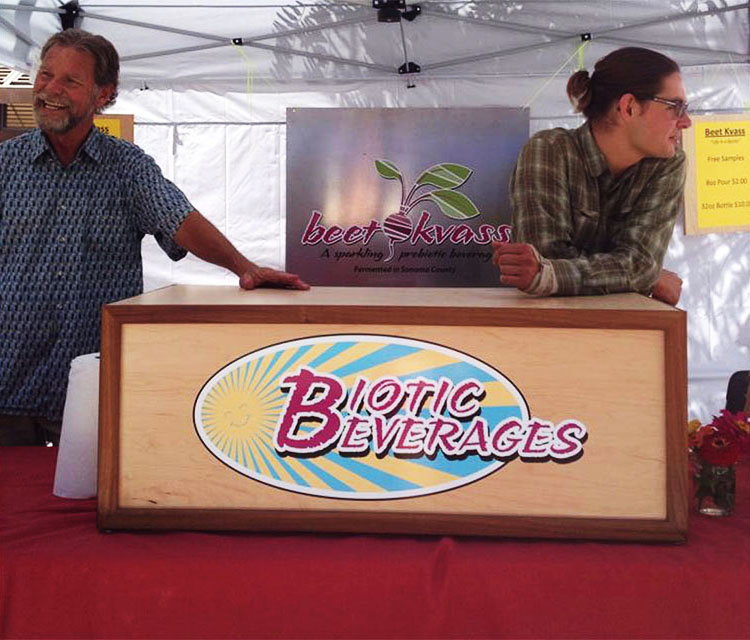Father and son team produce a beverage no really wants to drink—yet.
When Adam Johnston first drank kvass deep in the mountains of Northern China, it wasn’t exactly love at first sip.
“I thought it was weird-tasting,” says the 26-year-old Sebastopol resident. And yet, Johnston, who was at the time a globe-trotting college student with a knack for making beer and kombucha, couldn’t get the fermented drink, with roots in ancient times, out of his mind.
Upon returning to Northern California, he whipped up a batch of beet kvass in his parent’s Occidental kitchen. A rustic, probiotic drink that has no added refined sugar, it was a hit with friends and family. After a buyer for Whole Foods expressed interest, Adam and his father Michael, 62, a retired engineer and business owner, drafted up a business plan.
In March 2014, the father and son team launched Biotic Beverages, introducing their carbonated beet, ginger, and tumeric kvasses to Sonoma County farmers’ market patrons. At first, people didn’t know what kvass was, much less whether they wanted to drink it.
(Honestly, I reacted the same way on coming upon the Biotic Beverages booth at the West End Farmers’ Market. What is this stuff? I wondered. Soon, I couldn’t leave the market without purchasing a cup of their energizing turmeric kvass.)
“We found that it takes about four tries before people start to appreciate and crave the drink,” Michael says. In January 2015, Biotic Beverages picked up their first wholesale account with Community Market. After a rigorous inspection process, their kvass was added to the shelves of Whole Foods stores in Santa Rosa and Petaluma.
The crisp and carbonated drink, now available in stores for $3.99 for a 12-ounce bottle, bears small resemblance to Adam’s initial homemade kvass. It also stands apart from more traditional kvass, a fermented beverage popular in Russia and the Ukraine made from black or rye bread. The current product line is made by fermenting carrots and/or beets with probiotic lactobacillus bacteria. After a few days of fermentation, the liquid is transferred to kegs and then carbonated.
The decision to make kvass on a commercial scale made sense. “We live in the epicenter of the probiotic scene,” says Adam. He credits companies like the Sebastopolbased Revive for raising consumer demand for probiotic fermented beverages.
Like Kombucha, kvass has been touted as a nutritional powerhouse. Lily Mazzarella, owner of Farmacopia, an apothecary and integrative practice in Santa Rosa, says that recent studies show a link between gut health and the brain. For those who tolerate them, high-quality fermented beverages, like kvass, can be part of a “gut restoration” protocol to help heal from imbalances and inflammation brought on by antibiotics, stress, infection, and food allergies.
The word is getting out. In the early days, Adam only needed to source about five pounds of beets from area farms. As business picked up, he struggled to source larger amounts of root vegetables locally. Now, he buys 200 to 300 pounds of organic carrots, beets, and lemons a week from farms in Yolo and Santa Cruz counties. The ginger and turmeric comes from Hawaii.
“We’re trying to get more farmers to grow for us, but the agriculture space in Sonoma County makes it difficult,” Adam says. “Root crops, on a larger scale, aren’t the premium thing that people want to be growing.” The production does happen locally, in a commercial kitchen at the Finley Center in Santa Rosa.
While kvass may go back to biblical times in Slavic lands, it remains unfamiliar to most Americans. That’s changing, says Jennifer Harris, the coordinator of the Farm to Fermentation Festival. Biotic Beverages, she says, are paving the way for a new wave of fermented drinks: Those with no added sugars. She commends the Johnstons for breaking from the established niche.
“Their kvass is something so unlike what we’ve had produced in Sonoma County and America,” Harris says. “I’m excited to see them stick to their roots, quite literally, and make this real, hardy, earthy cleansing tonic that can satisfy our palate in ways that sweet beverages can’t.”

